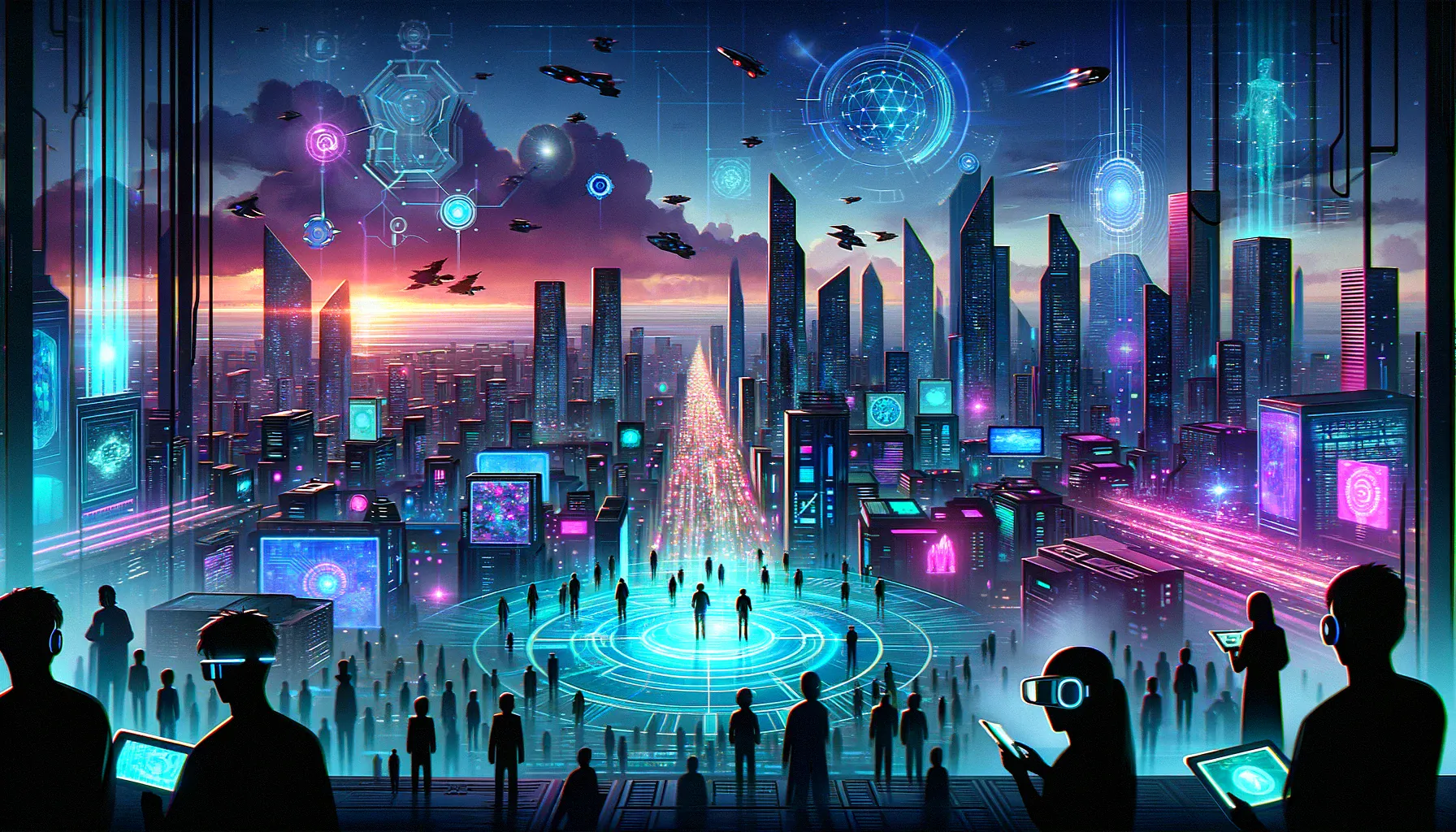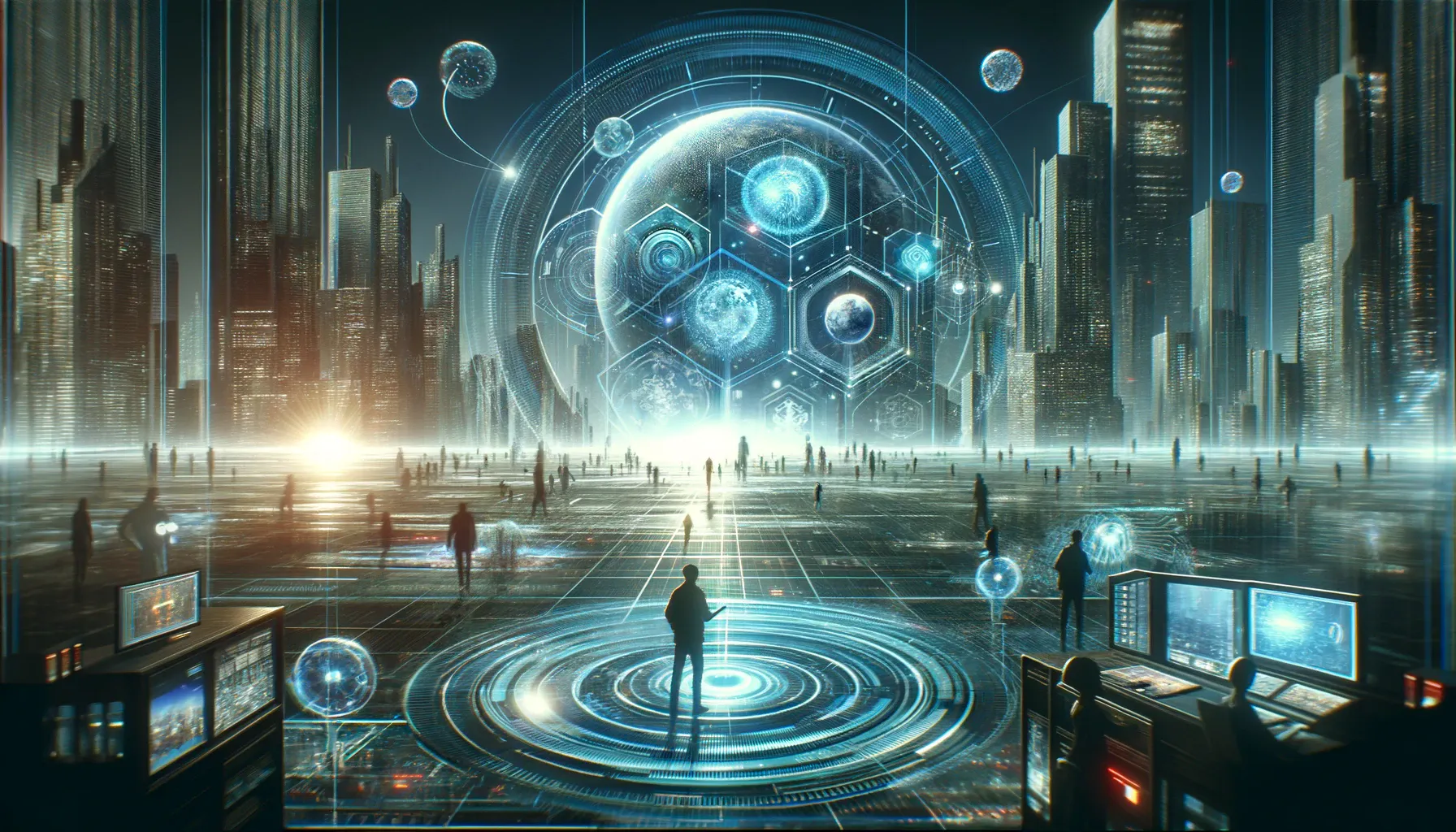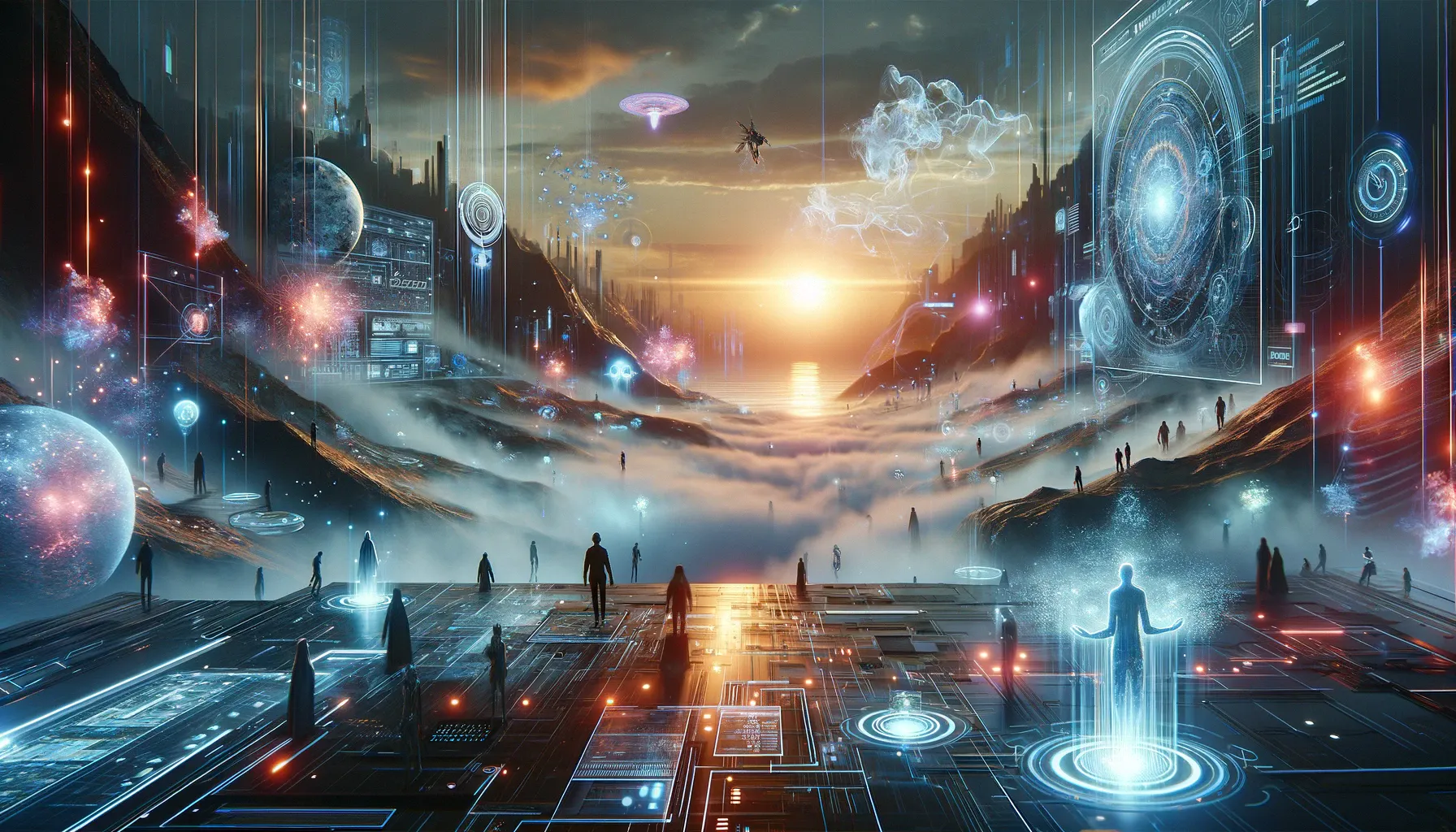Table of Contents
Metaverse Day marks a pivotal moment in recognizing the fusion of virtual and augmented reality (AR) with the internet, celebrating the transformation into a space of persistent online 3-D virtual environments accessible through both personal computing and VR/AR headsets. This day underscores the intersection of technology and culture, where digital advancements in immersive environments meet a new paradigm of social, cultural, and economic interaction.
It’s a recognition of how these technologies blur the physical and digital realms, reshaping social interactions, business models, and educational methods, pointing towards a future where the internet evolves beyond its current form. Observing Metaverse Day goes beyond acknowledging technological progress; it reflects on the profound societal and cultural impacts of the metaverse.

Highlighting the potential of the metaverse day in revolutionizing various sectors, offering new horizons for businesses with virtual marketplaces and digital real estate, and paving new paths in education and training with immersive, interactive experiences. It’s a celebration of a futuristic vision, prompting us to engage with, understand, and contribute to this burgeoning digital reality, ultimately shaping the way we entertain, work, learn, and interact socially in an increasingly digital world.
The Evolution of the Metaverse
The metaverse has undergone a remarkable evolution since its conception in Neal Stephenson’s 1992 novel “Snow Crash,” where it was depicted as a collective virtual space combining elements of augmented reality (AR), virtual reality (VR), and the internet. This idea took root in the late 1990s and early 2000s with platforms like ‘Second Life,’ setting the foundation for virtual interaction through avatars.
The 2000s saw this concept flourish with the popularity of massively multiplayer online role-playing games (MMORPGs) like ‘World of Warcraft,’ which expanded the virtual world experience. The 2010s brought significant advancements with the emergence of immersive VR technologies like Oculus Rift and AR experiences like Pokémon Go, blending digital and physical realities more seamlessly.
The integration of blockchain and cryptocurrencies introduced new dimensions to virtual economies, leading to user-owned spaces and assets. Entering the 2020s, the focus shifted towards creating virtual social spaces, as seen with VRChat and Meta’s emphasis on social virtual experiences. AI and machine learning began to enhance the dynamic and responsive nature of virtual environments.
Today, the metaverse is an ever-evolving amalgamation of VR, AR, AI, blockchain, and social media, envisioned as a space where digital and physical realities coexist. It’s anticipated to further integrate into everyday life, encompassing education, work, commerce, and entertainment, creating a parallel digital existence. The trajectory of the metaverse, marked by technological advancements and changing digital interactions, underscores its growing significance in our lives. “Metaverse Day” symbolizes this journey, encouraging exploration and engagement in this continually evolving digital realm.
Impacts on Society and Culture
The metaverse, a blend of virtual and physical realities, is profoundly reshaping society and culture, especially as we approach Metaverse Day. This evolving digital landscape fosters global virtual communities, transcending geographical boundaries and offering new platforms for social interaction and identity exploration. Traditional communication is evolving into immersive 3D experiences, altering how we interact and express ourselves. On the cultural front, the metaverse is catalyzing shifts in norms and behaviors.
Virtual economies are emerging, where digital goods and services redefine consumerism and economic models. This digital realm is also transforming work culture and education, making remote work and learning more interactive and immersive. However, as Metaverse Day highlights the significance of these digital realms, it also brings to light the challenges they pose.
The integration of digital and physical realities is blurring the line between everyday life and virtual existence, raising questions about technological dependency and the digital divide. Health and psychological effects, such as changes in attention spans and the rise of technologically induced disorders, are becoming concerns. These developments underline the need for a balanced approach to embracing the metaverse, ensuring that while we benefit from its advancements, we also address the implications for privacy, mental health, and societal well-being.
Technological Advancements Driving the Metaverse
The metaverse, a collective virtual shared space, is at the forefront of technological evolution, incorporating a range of advanced technologies to create an immersive and interactive digital experience. Augmented Reality (AR) and Virtual Reality (VR) are central to this, with AR merging digital information into our real environment and VR offering complete immersion into virtual worlds. These technologies are crucial in the metaverse for creating lifelike interactions and environments where users can engage seamlessly.
Additionally, the metaverse leverages Blockchain and Cryptocurrencies for secure transactions and digital asset management, essential for its burgeoning digital economy. 3D Reconstruction and Simulation add realism by mirroring real-world objects and settings, while Artificial Intelligence (AI) enriches user experiences through personalized interactions and responsive environments. The integration of Edge Computing and the speed of 5G networks are key to reducing latency, vital for real-time virtual interactions.

Moreover, Wearable Technology like VR headsets and haptic gloves heightens sensory experiences, bridging the gap between the physical and digital realms. As these technologies continue to advance, they promise to expand the metaverse’s capabilities, making it a more integral part of our daily lives, especially highlighted during events like Metaverse Day, which celebrates and explores these digital frontiers.
Challenges and Opportunities
The growth of the metaverse presents both significant challenges and opportunities across various domains. Here’s a detailed analysis:
Challenges of the Metaverse Growth: As we approach Metaverse Day, it’s crucial to recognize the challenges accompanying the growth of the metaverse. Technological limitations, such as the need for high-speed internet, advanced VR/AR devices, and powerful computing resources, pose significant barriers to global access. Privacy and data security are heightened concerns in this expansive digital landscape, where protecting user data against breaches is increasingly complex.
Regulatory and governance issues also emerge, given the metaverse’s cross-jurisdictional nature, necessitating clear legal frameworks for digital ownership, copyright, and virtual crime. Health and psychological impacts, including VR-induced motion sickness and potential effects on mental health and social behaviors, are concerns with the prolonged use of immersive technologies.
The metaverse risks exacerbating the digital divide, as unequal access to its technologies could lead to disparities in digital experiences and opportunities. Content moderation within the vast virtual world raises issues of censorship and exposure to harmful content. Lastly, the metaverse’s potential to disrupt current economic models poses challenges in adapting to new virtual economic structures, impacting jobs and industries.
Opportunities in the Metaverse: Metaverse Day highlights a revolutionary era in technology, marked by the development of the metaverse, which is driving advancements in VR/AR, AI, and blockchain. This innovation underpins new business models, where virtual goods, services, and experiences open untapped revenue streams. In education and training, the metaverse provides immersive platforms for remote learning and experiential simulations.
It fosters global collaboration, breaking down physical barriers in business, science, and culture, and reshapes the entertainment industry with more engaging, interactive experiences like gaming and virtual events. In real estate and architecture, it introduces virtual investment opportunities and influences real-world urban planning. Moreover, in healthcare, the metaverse is carving out new paths in telemedicine, therapy, and medical training, redefining how healthcare services are delivered.
While the metaverse presents complex challenges, particularly in technology, privacy, and governance, it also offers exciting opportunities for innovation, business, education, and global collaboration. Navigating these challenges and harnessing the opportunities will be key to realizing the full potential of digital realities.
The Future Landscape
The metaverse, particularly highlighted on Metaverse Day, is poised to revolutionize our daily experiences. Foreseen as an integral part of daily life, it will blend the physical and digital worlds, making virtual interactions as routine as smartphone use. Advanced VR and AR technologies are set to enhance this immersion, creating lifelike virtual environments, complemented by more user-friendly and affordable hardware.
Economically, the metaverse day could establish its unique systems, leveraging cryptocurrencies and NFTs, fostering a vibrant digital marketplace that mirrors and potentially impacts real-world economies. Socially and culturally, it’s expected to become a nexus for global interactions, hosting virtual events and fostering diverse subcultures, transcending physical boundaries.
In education and training, the metaverse offers innovative, immersive learning environments, making education more engaging and accessible. However, this digital expansion brings ethical and privacy concerns, necessitating robust regulations to safeguard user rights and safety.
Healthcare could see transformative applications in the metaverse, from telemedicine to virtual rehabilitation, broadening access to medical services. Content creation within the metaverse will likely flourish, enabling creators to craft unique digital experiences.
Environmental considerations, particularly the sustainability of powering vast virtual worlds, will be crucial. Finally, the metaverse promises unprecedented global connectivity, fostering international collaboration and understanding.

In essence, Metaverse Day symbolizes the threshold of a new era, where the metaverse melds technological innovation, social evolution, and economic development, offering boundless opportunities alongside significant challenges in this unfolding digital universe.
Metaverse Day Culmination
The metaverse day, a burgeoning domain built on VR, AR, and blockchain, is rapidly evolving. Currently, it encompasses diverse platforms for social, gaming, and professional interactions, enriched by a digital economy based on NFTs and cryptocurrencies. However, it faces challenges in privacy, security, and accessibility. Its future promises deeper integration into daily life, expanding into education, virtual tourism, and professional training, underpinned by technological advancements and emerging regulatory frameworks.
On Metaverse Day, individuals are encouraged to explore this digital realm’s possibilities, contributing to its growth and diversity. This day symbolizes the ongoing evolution of the metaverse, highlighting its potential to revolutionize social interaction, entertainment, and learning. Engagement with the metaverse day offers insights into the fusion of digital and physical realities, showcasing its role in transforming our digital experiences.